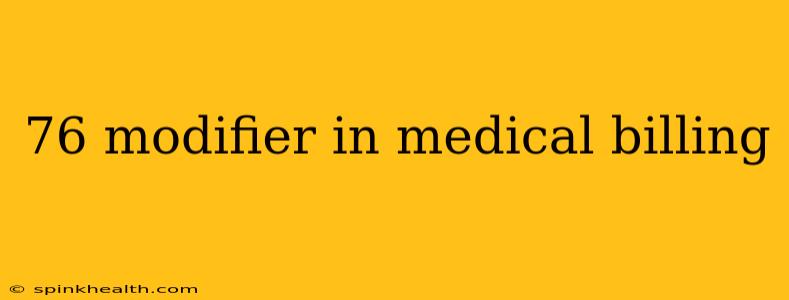Decoding the Mystery of Modifier 76: When "Repeat Procedure by Same Physician" Matters
Have you ever stumbled across modifier 76 in medical billing and felt a wave of confusion wash over you? You're not alone. This seemingly simple modifier packs a punch, impacting reimbursements and potentially even audits. Let's unravel the intricacies of modifier 76 and understand its crucial role in accurate medical billing.
Imagine this: a patient comes in for a follow-up appointment after a recent procedure. The physician, during this visit, performs the exact same procedure again. This isn't a new, separate procedure; it's a repetition of a previously performed service, and that's where modifier 76 steps in.
Modifier 76 signifies that the procedure or service described in the claim is a repeat procedure or service by the same physician. It's a critical distinction, informing the payer that this isn't a new occurrence but rather a necessary repetition of a previous action. Without this modifier, the claim might be rejected or even flagged for audit due to potential coding inaccuracies.
What are the key situations where modifier 76 is used?
Modifier 76 isn't just a random code; it has specific applications. Let's delve into some common scenarios:
1. Repeated Procedures on the Same Day: If a physician performs the same procedure multiple times during a single day, each subsequent procedure needs modifier 76 to differentiate it from the initial one. This ensures accurate billing and prevents unnecessary charges.
2. Repeat Procedures on Different Days: Even if the same procedure is performed on subsequent days, modifier 76 might be necessary if it's a repeat of an earlier procedure performed by the same physician. The key is the repetition by the same doctor.
3. Unintended Consequences of Omitting Modifier 76: Failing to append modifier 76 when necessary can lead to claim denials, delayed payments, or even accusations of fraudulent billing. Insurance companies scrutinize claims meticulously, and accurate coding is paramount.
How does Modifier 76 impact reimbursement?
The application of modifier 76 directly impacts reimbursement rates. While the exact impact varies depending on the payer and specific procedure, generally, a repeated procedure (using modifier 76) will have a lower reimbursement rate compared to an initial procedure. This reflects the reduced complexity and effort involved in a repeat service. Understanding this nuance is crucial for effective revenue cycle management.
What other modifiers are often used with modifier 76?
While modifier 76 stands alone in signifying a repeat procedure, it's not uncommon to see it coupled with other modifiers. This depends entirely on the circumstances and other specifics of the procedure. It's crucial to always consult the most up-to-date coding guidelines to determine which modifiers are appropriate for any given situation.
What are the common mistakes made with modifier 76?
One common mistake is applying modifier 76 when it's not necessary. This can lead to unnecessary reductions in reimbursement. Equally problematic is failing to apply it when needed. This can result in claim rejections or even worse, accusations of inappropriate billing. Proper training and adherence to established coding guidelines are vital to avoid these pitfalls.
How can I ensure accurate use of modifier 76?
The most effective way to guarantee accurate modifier 76 usage is through comprehensive medical coding training and staying abreast of the latest updates to coding guidelines. Regularly reviewing billing policies and actively participating in continuing education programs are vital to mastering this aspect of medical billing.
In conclusion, modifier 76 is a vital tool in medical billing. Mastering its usage is critical for maintaining accurate claim submissions, receiving timely payments, and avoiding potential compliance issues. By understanding its implications and applications, medical billing professionals can significantly improve their efficiency and accuracy, contributing to the overall financial health of the practice. Remember, precision is paramount in medical billing, and the proper use of modifiers like 76 underscores this principle.

